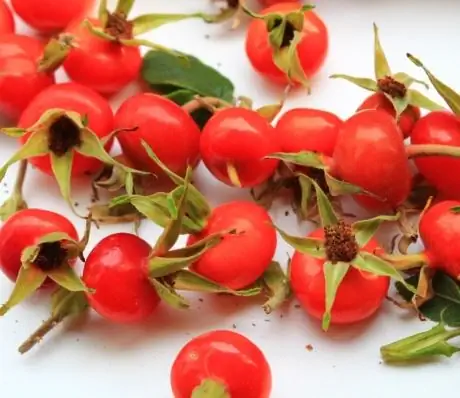- Author Rachel Wainwright wainwright@abchealthonline.com.
- Public 2023-12-15 07:39.
- Last modified 2025-11-02 20:14.
Jerusalem artichoke
Jerusalem artichoke is a widespread perennial tuberous plant from the Astrov family, also known as "earthen pear", "tuberous sunflower", "Volga turnip" and "Jerusalem artichoke". Jerusalem artichoke has an erect stem, and its inflorescence resembles a sunflower. The plant can reach a height of two meters.
The ratio of BJU in the product

Source: depositphotos.com How to burn 73 kcal?
| Walking | 18 minutes |
| Jogging | 8 minutes |
| Swimming | 6 minutes |
| A bike | 10 min. |
| Aerobics | 15 minutes. |
| Household chores | 24 minutes |
Useful properties of Jerusalem artichoke
Jerusalem artichoke is prized for its edible tubers and is cultivated in many countries as a valuable food and forage plant. Jerusalem artichoke tubers are formed on the roots and can be of various shapes and colors - from yellow to lilac-purple. The plant's tubers are also very different in weight, which varies from 10-15 to 100-150 g. The taste of the roots resembles sweet cabbage stalk or asparagus.
Jerusalem artichoke is significantly superior in iron content to vegetables such as carrots, turnips, potatoes and beets. In addition, tubers contain chromium, potassium, silicon, calcium, sodium, magnesium, fluorine, and other minerals. The balance of its constituent trace elements helps to improve blood parameters and enhance the functional activity of the endocrine, immune and nervous systems of the body.
Jerusalem artichoke surpasses sugar cane and sugar beet in the amount of carbohydrates. Also, the beneficial properties of Jerusalem artichoke are determined by its constituent parts:
- Cellulose;
- Pectins (high molecular weight carbohydrates) with astringent, absorbent and gelling properties. They help lower cholesterol levels in the body, improve metabolic processes and peripheral circulation, as well as normalize intestinal motility;
- Organic polyacids (citric, raspberry, malic, succinic and fumaric acids), which, in combination with vitamin C, enhance the antioxidant properties of Jerusalem artichoke;
- Fats;
- Proteins containing ten essential amino acids, namely valine, lysine, arginine, isoleucine, histidine, leucine, threonine, methionine, tryptophan and phenylalanine. Protein compounds of Jerusalem artichoke tubers are similar in structure to proteins of the thymus gland (thymus) and are regulators of cells of the immune system (at the stage of maturation and functional activity);
- Vitamins - B1, B6, C, B2, PP.
The most valuable useful properties of Jerusalem artichoke are determined by inulin, which is a natural analogue of insulin. In diabetes mellitus, the benefits of Jerusalem artichoke are greater if fresh root vegetables are consumed in the fall, since during storage, part of the inulin that is part of it turns into fructose.
Also, the properties of Jerusalem artichoke that are rare for root crops include the fact that plant tubers do not accumulate heavy metals, radioactive elements and nitrates, which can provoke the development of oncological processes.
The calorie content of Jerusalem artichoke is low and amounts to 61 kcal, which makes it one of the foods that promote weight loss.
In addition to its low calorie content, Jerusalem artichoke has a number of other properties that have a beneficial effect on many serious diseases associated with obesity, namely:
- Helps lower blood pressure;
- Reduce and weaken attacks of angina pectoris;
- Reduce the risk of developing myocardial infarction and cerebral stroke;
- Reduce exacerbation of cholecystitis and pancreatitis.
Jerusalem artichoke use
Many nutritionists advise replacing potatoes with Jerusalem artichoke and appreciate the plant for its dietary and healing properties. There is Jerusalem artichoke in any form (boiled, fried, stewed, salted and pickled). However, the tubers of the plant are most useful in their raw form.
With diabetes mellitus, it is recommended to eat 2-3 Jerusalem artichoke tubers ten minutes before meals up to three times a day. Long-term use of the root vegetables of the plant helps to reduce blood sugar levels, which is also the prevention of diabetes mellitus in people with a predisposition to this disease. In addition, with the systematic use of Jerusalem artichoke, vision improves.
For heartburn, to reduce the acidity of the stomach, it is recommended to take fresh juice from Jerusalem artichoke. Since the juice has a pronounced anti-inflammatory effect, it is also used:
- In the treatment of polyarthritis;
- To normalize the work of the digestive system (with intestinal colic and stomach pain);
- For the prevention of diseases of the cardiovascular system;
- In the treatment of constipation;
- As an adjuvant therapy in the treatment of atherosclerosis, coronary artery disease, tachycardia and hypertension.
Many studies have also noted the benefits of Jerusalem artichoke for urolithiasis, gout, salt deposition, and anemia. A decoction of tubers is used to lower blood sugar and blood pressure, as well as to increase hemoglobin.

In addition, the benefits of Jerusalem artichoke lie in the combined action of fiber and inulin, due to which the plant has antitoxic and antioxidant properties. Jerusalem artichoke tubers neutralize the negative effects of environmental influences and contribute to the elimination of toxins, heavy metal salts, radionuclides and excess cholesterol from the body.
Jerusalem artichoke has long been used as an effective anti-wrinkle remedy. For this, the tubers chopped on a grater are applied to the face for 15-20 minutes. If such procedures are carried out twice a week, then a tangible effect, as a rule, occurs in a month. It is also useful to add linseed or hemp oil to Jerusalem artichoke gruel.
Contraindications
Jerusalem artichoke has practically no contraindications, except for individual intolerance, and the low calorie content of Jerusalem artichoke allows you to use it in your daily diet. In order to prevent the tubers from causing flatulence, it is recommended to use them after heat treatment or in combination with spices that prevent gas formation (for example, caraway or coriander).
YouTube video related to the article:
Found a mistake in the text? Select it and press Ctrl + Enter.






